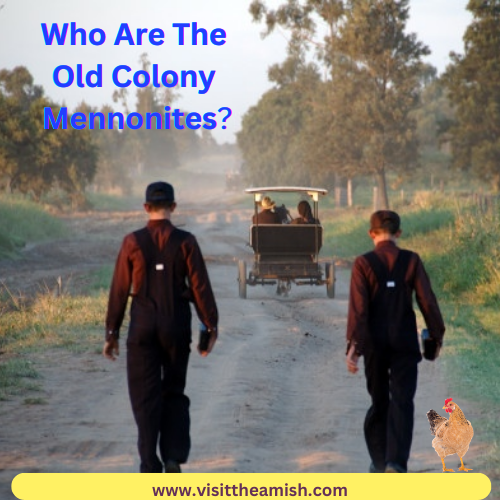The Old Colony Mennonites are a conservative Anabaptist sect that traces its origins to the Russian Mennonite community in the late 19th and early 20th centuries. They are known for their traditional way of life, including their plain dress, horse-drawn transportation, and rejection of many modern technologies.
Old Colony Mennonites were first established in the early 1800s in the Chortitza colony in present-day Ukraine. They later settled in other parts of Russia, as well as in Canada and Mexico. However, they faced persecution in Russia and many chose to emigrate to North and South America in the late 19th and early 20th centuries.
In Canada and Mexico, Old Colony Mennonites have largely maintained their traditional way of life and have mostly segregated themselves from the non-Mennonite population. They live in small, rural communities, often organized around a central church, where they work as farmers, carpenters, and blacksmiths. They speak a dialect of Low German called Plautdietsch, and also use High German and English in church services.
One of the most distinctive aspects of Old Colony Mennonite culture is their adherence to strict codes of conduct, which are based on their interpretation of the Bible. This includes a prohibition on the use of certain technologies such as cars, telephones, and electricity, which they believe are distractions from a simple, God-centered life. They also reject higher education and involvement in politics.
Old Colony Mennonites also place a strong emphasis on community and family. They are known for their strong sense of mutual aid and support, and they often help each other with tasks such as planting and harvesting crops. They also place a strong emphasis on the traditional roles of men and women, with men working outside the home and women responsible for domestic tasks and child-rearing.
In recent years, Old Colony Mennonites have faced some challenges to their traditional way of life. The increasing modernity of the world around them has led to some members questioning the strict codes of conduct and seeking more engagement with the outside world. Additionally, there have been some controversies surrounding the treatment of women and children within the community, which have led to some calls for reform. Despite these challenges, however, the Old Colony Mennonite community remains a vibrant and distinctive part of North American society.
Old Colony Mennonites are also known for their commitment to nonviolence and peacemaking. They believe in turning the other cheek and refuse to participate in military service or hold political office. They also avoid litigation, instead using their own church-run dispute resolution process to settle conflicts.
The community also has a strong sense of social responsibility and often engage in charitable activities such as disaster relief, feeding the hungry, and supporting refugees. They also provide a lot of support to their own community members, through the mutual aid system, where everyone pitches in to help in times of need.
Despite their conservative and traditional lifestyle, Old Colony Mennonites have not been immune to the impact of modernity. Some of the youth, in recent years, have started to question the strict codes of conduct and have sought to engage more with the outside world. There have also been instances of members leaving the community to pursue higher education or professional careers. However, most of the Old Colony Mennonite community still holds on to their traditional way of life and values.
In recent years, the Old Colony Mennonite communities have also been facing some legal issues. Some Canadian and Mexican government officials have tried to force them to send their children to public schools, citing the importance of education. But the Old Colony Mennonites argue that their own religious schools provide a moral education that is just as important as academics.
In conclusion, the Old Colony Mennonites are a distinctive and conservative Anabaptist sect that traces its origins to the Russian Mennonite community in the late 19th and early 20th centuries. They are known for their traditional way of life, commitment to nonviolence and peacemaking, and strong sense of community and social responsibility. Despite facing some challenges in recent years, the Old Colony Mennonite community remains a vibrant and distinct part of North American society.

